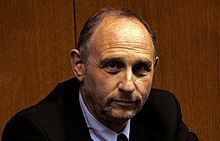Yuri Stern
Yuri Stern ( Hebrew יורי שטרן; * March 29, 1949 in Moscow , Soviet Union ; † January 16, 2007 in Jerusalem , Israel ) was an Israeli politician and member of the 14th to 17th Knesset .
Life
After completing his studies in economics, Yuri Stern worked from 1971 to 1981 at Moscow University as a lecturer at the Faculty of Economics. From 1978 to 1981 he was active in the Zionist movement in the USSR and finally emigrated to Israel in 1981. After his naturalization, he was head of the El David settlement from 1983 to 1985, and from 1983 to the mid-1990s he campaigned for various organizations that fought for the naturalization of Jews from the Soviet Union , some of which he did had also founded.
politics
Stern was first elected to the 14th Knesset in 1996 as a candidate for the Yisrael Be'aliyah party. In 1999 he joined the Israel Beitenu party and was re-elected. During his time as a politician, he worked on various committees and was active, among other things, in the areas of economics and work, but also campaigned for Jews living abroad. From March 2001 to March 2002 he was deputy in the Prime Minister's office. In the election of the 17th Knesset in 2006, he was re-elected, again on the list of the Israel Beitenu party, which at the time of his death had been part of a ruling coalition under Ehud Olmert for almost three months . Stern was one of the ultra-nationalist circles in Israel; he compared radical Islam to National Socialism and claimed a connection between radical Muslim circles and neo-Nazi movements. Stern strictly opposed any withdrawal from the occupied Palestinian territories and the evacuation of the Israeli settlements established there. Stern was the founder and chairman of the committee for Christian friends in the Knesset and especially sought cooperation with fundamentalist evangelical Christians, whom he described as the "most reliable allies" of Israel.
He died of cancer.
author
Stern has published several articles for the Wall Street Journal , the Jerusalem Post, and numerous articles and chapters in books on economics in the USSR.
Web links
- Israel Foreign Ministry reported Stern's death
- Announcement on the Knesset website
- Obituary in the Israel network
| personal data | |
|---|---|
| SURNAME | Stern, Yuri |
| BRIEF DESCRIPTION | Israeli politician |
| DATE OF BIRTH | March 29, 1949 |
| PLACE OF BIRTH | Moscow , Soviet Union |
| DATE OF DEATH | January 16, 2007 |
| Place of death | Jerusalem , Israel |
